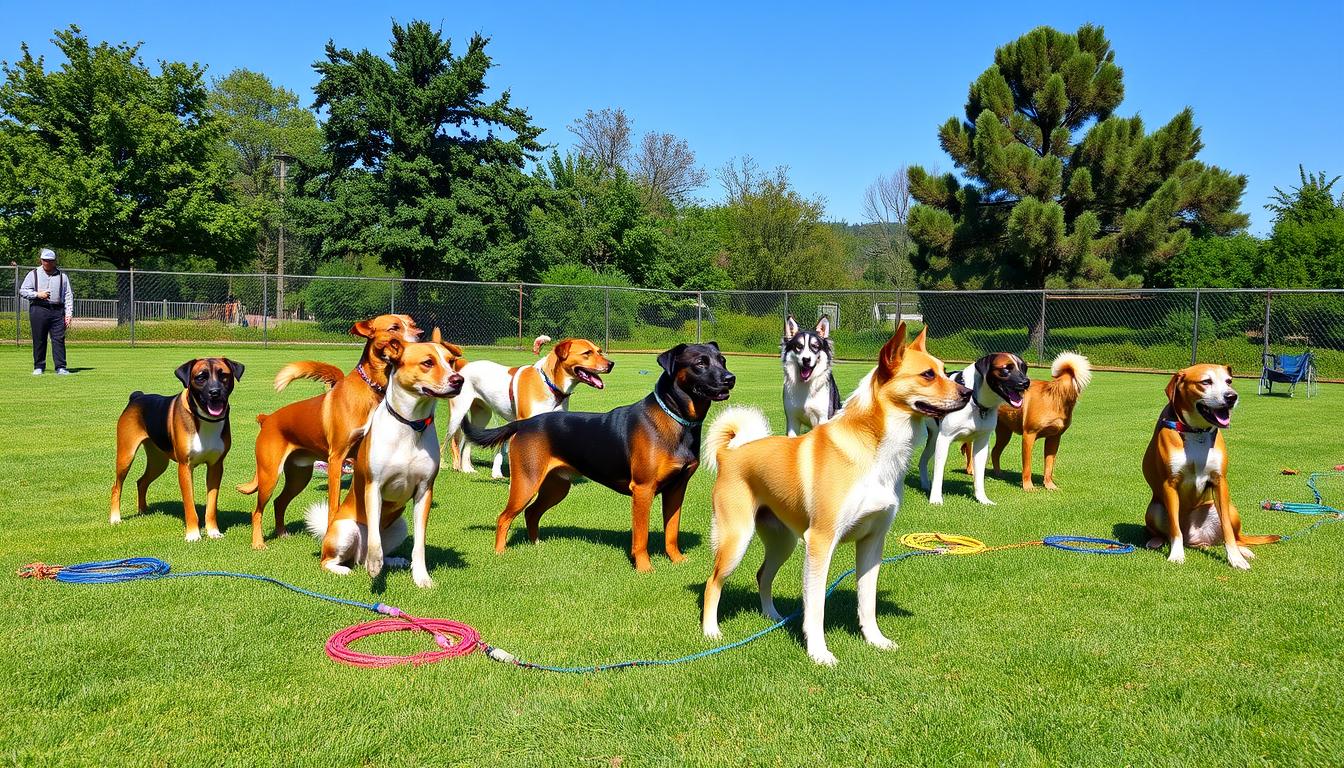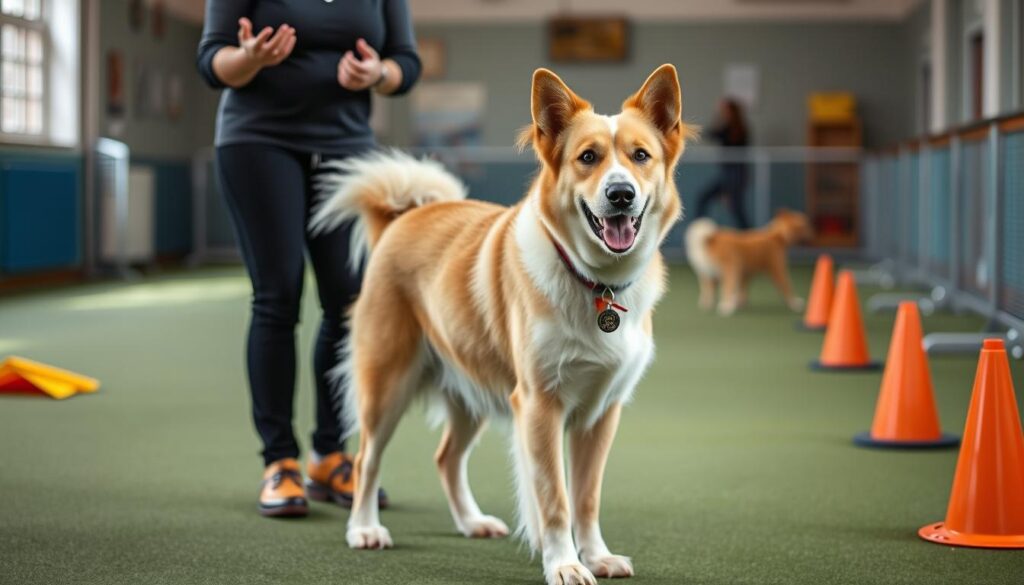Dog Standing: Learn Essential Training Tips & Commands

Did you know dogs often listen better to hand signals than words? They pay close attention to human body language. Teaching your dog to stand is key in dog training. It helps them understand other commands like sit and down first12. This article will show you how to get your dog to stand up, with helpful tips and important commands.
Learning to train your dog to stand can boost their obedience and confidence1. As you start training, make sure the area is quiet and keep your dog motivated3. By the end of this guide, you’ll know how to get your dog to stand on command. This will make training easier and more fun for both of you.
Key Takeaways
- Dogs respond better to hand signals, enhancing training effectiveness.
- Teaching sit and down commands first is essential before moving to the stand command.
- Practice the stand command in quiet environments to keep your dog focused.
- Short training sessions ending positively help maintain your dog’s confidence.
- Incorporate the stand command into daily routines for better reinforcement.
- Use cheerleading techniques to keep your dog motivated during training.
Introduction to Dog Standing
Understanding dog standing is key for dog owners. This command teaches your pet standing posture. It helps your dog stand up straight on all fours without moving.
Learning this command boosts your dog’s obedience and behavior. It’s especially useful during grooming and medical exams.
Keeping a correct dog standing posture shows calmness and readiness. It’s vital in social situations, like meeting new dogs or people. Dogs that know the dog standing command are less anxious in stressful situations.
Use positive reinforcement like treats and praise to teach your dog. This builds their confidence to stand when needed. The command helps your dog feel comfortable in situations that require their cooperation. Many trainers stress the need for patience and persistence in teaching this important behavior4.
Importance of Dog Standing in Training
Teaching your dog to stand properly is key to their training and behavior. It improves balance and prepares them for many situations.
A strong stand command is essential for daily tasks. It helps when putting on a harness or cleaning paws. It also makes grooming and vet visits easier5. For dog sports fans, it’s a must-have skill for shows and competitions5.
A dog that stands well shows confidence and stability. Training them early, between one and two years, makes the command more effective6. This skill is useful in public, helping your dog behave well.
By practicing the stand command in different places, you build a strong foundation. This command helps your dog interact better with others and people. It makes your pet happier and more well-adjusted when living in the city.
| Training Aspect | Importance |
|---|---|
| Daily Interactions | Facilitates putting on harness, cleaning paws, and grooming |
| Veterinary Exams | Keeps the dog still for easier examination |
| Dog Sports | Crucial for conformation shows and obedience competitions |
| Training Locations | Reinforces command reliability in varied environments |
Adding these elements to your training helps your dog understand and use the stand command well56.
Basic Commands Related to Dog Standing
Before teaching the dog standing cue, make sure your dog knows basic dog commands like Sit and Down. These commands are the building blocks for the standing command.
Start teaching “Stand” after your dog sits or lies down. This approach makes training easier. Give treats right away when your dog stands up. This helps them learn and remember the command better.
Train in a quiet place because dogs get distracted easily. Visual cues are key, especially for older dogs who might lose their hearing7. Keep your hand signals the same throughout training. Changing them can confuse your dog and slow down learning8.
There are seven basic commands that are very useful, like Sit, Down, and Stand. Using hand signals and verbal cues together makes your dog more responsive9.
| Command | Type | Significance |
|---|---|---|
| Sit | Basic | Foundation for other commands |
| Down | Basic | Helps calm the dog |
| Stand | Intermediate | Vital for specific tasks and activities |
| Come | Basic | Essential for recall |
| Stay | Basic | Keeps the dog in place |
| Leave it | Intermediate | Prevents ingestion of harmful items |
| Heel | Advanced | Improves walking manners |
Using a clicker as a sound marker can be an effective tool during the training process, giving clear feedback to the dog when they exhibit the desired behavior.
Give treats after every successful command to reinforce good behavior during training9.
Understanding the Dog Standing Behavior

It’s important for dog owners to understand their pet’s standing behavior. This helps in effective communication and training. Knowing when to ask your dog to stand is key in many situations.
Common Situations Where Dog Standing is Necessary
Dogs need to stand in many situations. These include:
- Grooming sessions
- Veterinary check-ups
- Obedience competitions
- Training exercises
- Socializing with other dogs
Teaching your dog to stand makes interactions smoother. It helps them behave well in public. It also prevents problems during grooming or vet visits.
Benefits of Teaching Your Dog to Stand
Teaching your dog to stand has many benefits. It supports:
- Self-control: A well-trained dog is better in busy places.
- Core strength: Standing exercises improve your dog’s core health.
- Muscle tone: Standing exercises also boost muscle tone, making your dog fitter.
- Enhanced communication: Knowing your dog’s standing behavior can improve your communication. Dogs show their feelings through their posture and movements.
Teaching this command improves your dog’s manners and physical health. It also strengthens your bond with your dog. Understanding dog body language is crucial for effective training as indicated in research10.
Step-by-Step Guide to Teaching Dog Standing
Teaching your dog to stand is a detailed process. It starts with preparing your dog for training. This means setting up the right environment and knowing the learning stages.
Preparing for Training Sessions
First, pick a quiet, distraction-free spot for training. Make sure your dog feels safe and comfortable there. Have their favorite treats ready to motivate them.
Initial Steps for Introducing the Command
Start with simple, clear commands. Place your dog in a sitting or lying position. Use treats to lure them into standing. Add a hand signal to help them understand.
As they get better, start rewarding them less often. Begin with rewarding every correct response, then reduce it to 70%, and finally to 50%. This makes treats a surprise reward as training goes on11. It’s important to reward good behavior consistently12.
Next, practice in different places with distractions. This helps your dog learn to respond in various situations. It’s key for effective training13.
Commands: Teach Your Dog to Stand

Teaching your dog to stand on command is key for good behavior. Start with lots of treats to motivate them. Once they get it, use praise to keep them excited about learning.
Using Treats and Rewards Effectively
Begin by using treats to teach your dog the stand command. Use three lures for each hand signal, repeating it twenty times. This helps them feel comfortable with the command.
Also, use the command “Stand” clearly and consistently. Practice it with the hand signal. Reward them with treats and praise when they get it right1314.
Correcting Mistakes During Training
If your dog makes mistakes, gently guide them back to simpler commands. Avoid harsh corrections. Instead, use positive reinforcement to help them learn.
If they struggle with standing, remember to work on their core strength. With consistent practice, they’ll master the command in about eight weeks1314.
Advanced Techniques for Dog Standing Training
Once your dog knows basic commands, you can start using advanced training methods. Start by adding distractions, like training in a park or group classes. This helps your dog stay focused in different settings15. Also, increase how long your dog must stand, from seconds to minutes. Regular practice makes this command stronger, useful for daily life and competitions15.
Teaching your dog to position their feet correctly is another step up. This improves their balance in competitions16. You can use platforms to help with this. Platforms make sure your dog can stand easily and stay stable16.
Using a clicker can make training more fun and effective17. Clickers help your dog understand exactly when they do something right. Adding tricks like leg weaves or bowing can also boost their skills and learning ability17.
To wrap up your advanced training, follow a structured plan:
| Technique | Description | Purpose |
|---|---|---|
| Distraction Training | Practice in a variety of environments. | Enhances focus despite distractions. |
| Duration Training | Gradually increase standing time. | Builds endurance and reliability of the command. |
| Foot Positioning | Teach proper weight distribution. | Improves stability and confidence. |
| Clicker Training | Use a clicker to mark successful behaviors. | Improves response rates and learning. |
These methods will not only improve your dog’s standing skills but also make training more enjoyable for both of you1716.
Proofing Your Dog’s Stand Command
Teaching your dog to stand on command is key. It means they can do it in many places and situations. Start in places your dog knows well. Then, move to new spots to challenge them.
Training in different places a few times a week helps. It makes your dog ready to perform anywhere18.
Practicing with Distractions
When training, manage distractions well. As your dog gets better, add distractions to mimic real life. If they struggle, make the task easier again19.
Watch for signs of stress like panting. This ensures they learn comfortably18.
Increasing Duration and Distance
After they stand well, make them stay longer. This builds their endurance and focus. Training in different places also strengthens your bond20.
For more tips, check out the guide on proofing dog standing.
FAQ
Why should I teach my dog to stand?
What commands should my dog know before learning to stand?
How can I encourage my dog to stand properly?
What are some common scenarios where a standing dog is necessary?
How long should I practice the stand command with my dog?
How can I handle mistakes during training?
What is the importance of proofing the stand command?
How do advanced techniques differ from basic commands?
Source Links
- https://www.thesprucepets.com/train-your-dog-to-stand-1117299 – This Is How to Teach Your Pooch How to Stand on Command
- https://4h.extension.wisc.edu/files/2021/05/The-Basics-of-Training-Your-Dog.pdf – Untitled-4
- https://www.dogmammas.com/blogs/news/show-dog-training-you-can-use-at-home-tip-2-stand-stay?srsltid=AfmBOoo09HWs8KDoY878_dJa6uoc7VUtn3wC3z2H3GHx81j5QdAwPcHt – Show Dog Training You Can Use at Home – Tip #2 Stand Stay – Dog Mamma’s Organic Dog Treats
- https://www.mlar.org/media/1630/5-dog-dog-introductions.pdf – PDF
- https://www.akc.org/expert-advice/training/teach-dog-stand-cue/ – No title found
- https://crpsservicedog.weebly.com/sd-blog/task-training-teaching-the-bracing-stand – Task Training: Teaching the Bracing Stand
- https://www.obedienceroad.com/blog/my-list-of-commands – My List of Commands
- https://www.tasteofthewildpetfood.com/training-behavior/list-of-dog-commands-hand-signals-for-beginners/ – A List of Dog Commands & Hand Signals for Beginners
- https://www.dogseechew.in/blog/20-essential-dog-training-commands-orders-list-basic-to-advanced – 20 Essential Dog Training Commands – (Basic to Advanced) | Dogsee
- https://www.akc.org/expert-advice/advice/how-to-read-dog-body-language/ – No title found
- https://www.dog-training-excellence.com/training-your-dog-to-stand.html – Training Your Dog To Stand with Positive and Reliable Techniques
- https://www.akc.org/expert-advice/training/how-to-teach-your-dog-to-sit/ – No title found
- https://www.successdogs.com/dog-training-lessons/train-dog-stand-hind-legs/ – How To Train A Dog To Stand On Its Hind Legs
- https://www.dogmammas.com/blogs/news/show-dog-training-you-can-use-at-home-tip-2-stand-stay?srsltid=AfmBOoqyctUOaHzKiXrbbsxqUgxXNCOOn2M5yXnAgJMt8x1d00kWKPdw – Show Dog Training You Can Use at Home – Tip #2 Stand Stay – Dog Mamma’s Organic Dog Treats
- https://www.whole-dog-journal.com/blog/take-the-sit-down-stand-challenge/ – Take the Sit/Down/Stand challenge! – Whole Dog Journal
- https://www.fenzidogsportsacademy.com/blog/how-to-get-perfect-position-changes – How to Get Perfect Position Changes
- https://www.akc.org/expert-advice/training/advanced-dog-tricks/ – No title found
- https://debbyquigley.com/proofing-perfect-outline/ – Proofing Perfect outline – DebbyQuigley.com
- https://debbyquigley.com/games-a-must-for-all-great-dogs/stands-classroom/ – Stands Classroom – DebbyQuigley.com
- http://siriusdog.com/ecollar-proofing/ – PROOFING THE BEHAVIORS | SIRIUS DOG



